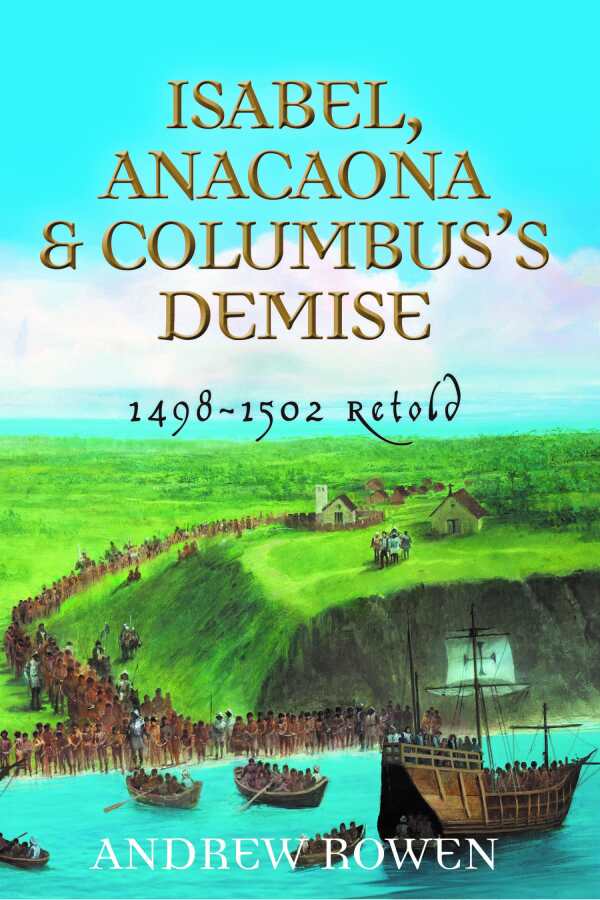Isabel, Anacaona & Columbus’s Demise
1498-1502 Retold
Polarized political interests and religious extremes are emphasized in Isabel, Anacaona & Columbus’s Demise, a historical tome set against a backdrop of verdant landscapes, tribal ceremonies, insurrections, and perilous trade.
Andrew Rowen’s epic historical novel Isabel, Anacaona & Columbus’s Demise is about the power struggles behind Spain’s late-fifteenth-century quest to colonize the Caribbean.
By 1498, Italian-born explorer Columbus presides over the island territory of Española on behalf of Spain’s Queen Isabel and King Fernando. Columbus is a savvy mariner whose obsessive nature compels him to plunder gold and other natural resources from “the Indies.” This quest leads to the ruthless enslavement of much of the region’s Indigenous population. Upon learning of the enforced slavery and other troubling acts being committed in the name of the Spanish crown, Isabel decides to replace her once favored admiral with a new colonial governor.
The narrative perspective is varied. It includes the voices of mercurial, shrewd Columbus, diplomatic and pious Isabel, and Anacaona, a member of a ruling Taíno family who observes the arrival of the Spaniards with dread. The later is tactical, using her feminine wiles to negotiate and protect her tribe. Columbus’s favorite interpreter, Diego, is also given space; he values his bond with Columbus, forged through shared hardships and travels, while also recognizing Columbus’s capacity for cruelty and ingratitude. Their development is complex and compelling, as is that of secondary characters: Some settlers are escaping Spain’s classist society; some marry Indigenous women and form meaningful attachments to their new communities. Others are exploitative and intolerant.
In this rich story set against a backdrop of verdant landscapes, tribal ceremonies, insurrections, and the perilous spice and gem trade, polarized political interests and religious extremes are emphasized. Indeed, Christianity is a frequent excuse for people’s rapacious attempts at social domination—critiqued from the outside by Anacaona, who resents the “Christ-spirit’s” guidance of the “pale men’s conquest” and reviles the climate of violence, disease, and subjugation. Meanwhile, Isabel and her Catholic missionaries express the ardent desire for salvation, and Columbus, who is passionate about exploring the unknown, is both dimensional and reprehensible.
Grounding details abound. One of Columbus’s voyages is overwhelmed by scorching equatorial heat that’s likened to a “descent into Satan’s inferno.” In Spain, Isabel and Fernando are distracted from their colonial ambitions by an uprising of Muslims who reject enforced Christianity; beyond the Alhambra Palace, the streets are “crowded with turbaned men and veiled women” and a mosque is filled “with infidel.” However, as the book continues, some elements of its plot become repetitive. Further, extended scenes devoted to courtly bureaucracy slow its general pace. However, the arrival of a fearsome hurricane leads into the volume’s extraordinary conclusion, in which Indigenous and European populations face varying degrees of violence.
An enthralling historical novel, Isabel, Anacaona & Columbus’s Demise chronicles the ruinous progress of European colonialism.
Reviewed by
Meg Nola
Disclosure: This article is not an endorsement, but a review. The publisher of this book provided free copies of the book and paid a small fee to have their book reviewed by a professional reviewer. Foreword Reviews and Clarion Reviews make no guarantee that the publisher will receive a positive review. Foreword Magazine, Inc. is disclosing this in accordance with the Federal Trade Commission’s 16 CFR, Part 255.

